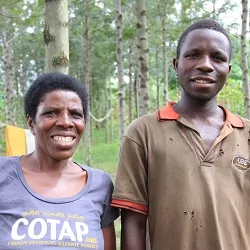The basic answer
Carbon offsets are a way to pay another entity to remove the carbon dioxide (CO2) you emit through driving, flying, and home energy use.
COTAP and carbon offsets
At COTAP, we enable individuals to calculate their CO2 emissions, and then donate to our projects based on those emissions. We pool donations from many individuals and then match them with accredited forestry projects in least-developed countries that commit to creating meaningful and verifiable economic benefits for the poor. COTAP commits to the annual monitoring and reporting of our projects’ social and environmental progress throughout the lifespan of each project.
The more detailed, “nerdy” answer…
Carbon offsetting is a structured transaction through which one entity compensates another entity for performing project activity which counteracts a specific quantity of its greenhouse gas (GHG) emissions. By paying another party to remove GHG’s, an entity is able to counteract emissions it has not yet eliminated itself.
Carbon offsets are the transactional instrument used in carbon offsetting, and offsets are measured, accredited, issued, tracked, and retired in increments of one metric tonne (2,204.6 pounds) of carbon dioxide-equivalent (CO2e). Thus, a carbon offset is a metric tonne of CO2 removed, or to be removed, from the atmosphere by an accredited project, or one tonne of CO2e of one of the other five other primary GHG’s (methane, nitrous oxide, hydrofluorocarbon, perfluorcarbon, and sulphur hexafluoride).
Offsets are a tool which must be used properly
Carbon offsetting is a highly compelling transaction for individuals who are concerned about their emissions and want to take action in parallel to, but not in place of, longer-term and more expensive efforts to directly reduce their carbon emissions (like buying a more fuel efficient car or re-insulating their attic).
Like any other tool, carbon offsets can be misused. COTAP does not support the use of offsetting by entities which plan to do nothing about eventually making direct reductions to their emissions, nor do we support the use of carbon offsets as a way to compensate for increasing one’s emissions.





















